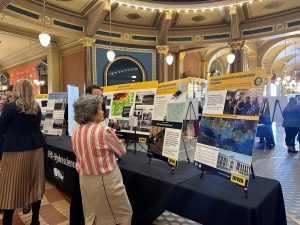Education Iowa Flood Center, geological survey see federal funding cuts hit programs
March 11th, 2025 by Ric Hanson
(Des Moines, Iowa) – Amid an uncertain situation surrounding federal funding, representatives from the Iowa Flood Center and Iowa Geological Survey mingled with Iowa lawmakers Tuesday to make their case for increasing state allocations.
According to the Iowa Capital Dispatch, students, staff, researchers and leaders from the Iowa Flood Center and Iowa Geological Survey, both housed at the University of Iowa, displayed charts and screens showing data from the organizations’ projects and initiatives in the first floor rotunda of the Iowa Capitol Tuesday morning for legislators and the public to peruse.
Iowa Flood Center Director Larry Weber said groups from the organization have visited Des Moines every legislative session since the center’s founding 16 years ago, and it is an important part of the work to expose to students hoping to turn their work at the center into a career.
State funding is more important than ever for the center and survey, as both teams have already felt hits from paused and cut federal grants. Weber said the center has had grants rescinded in the areas of climate, renewable energy and impacts of airborne and waterborne pollutants on public health. These funds had already been awarded to the center, he said, but were still in the contracting process to be dispensed. Total lost funding sits between $35 million and $40 million over the next five years.

The Iowa Flood Center, Iowa Geological Survey and other University of Iowa-housed organizations displayed projects and initiatives for lawmakers at the Iowa Capitol March 11, 2025. (Photo by Brooklyn Draisey/Iowa Capital Dispatch)
Unlike some graduate programs at Iowa State University, Weber said the center has not rescinded any offers to graduate students, but fewer acceptances are being sent out. Around 100 graduate students are involved with the center, Weber said, alongside around 80 full-time staff and 30 faculty members.
Keith Schilling, state geologist and director of the Iowa Geological Survey, said funding has paused for a project near Council Bluffs where the survey would explore the area’s subsurface geology for potential carbon sequestration projects.
According to a November news release from the university, the U.S. Department of Energy was contributing $9 million to the two-year, $11.3 million study to determine whether carbon dioxide could be injected deep underground in basalt found a half-mile underneath the Walter Scott, Jr. Energy Center power plant, rather than have it pumped out through pipelines.
When speaking with lawmakers about much-needed funding, Schilling said he framed it less around a lack of federal dollars and more around a need for more state support. The state geologist said he spoke with lawmakers about finding more funding for staff support, a new drill rig to reach underground aquifers and to expand groundwater monitoring across the state.
Contracts from private entities have helped fill gaps left from state and federal funding and allowed the survey to conduct work it wouldn’t have had the money to do otherwise, Schilling said. One drawback of private contracts is that they aren’t for statewide study but for doing specific work, usually at only one location, he said. Schilling said if state lawmakers want to know what’s going on with Iowa’s groundwater and other subjects, they need to make sure the survey has the money it needs to conduct its work and address concerns.
Both the survey and the flood center have been flat-funded for years, Schilling and Weber said, and it’s time for an increase in state allocations so the organizations can expand and better their work.


